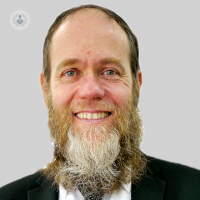An expert's explanation of age-related macular degeneration (ARMD)
Written in association with:Age-related macular degeneration is a common eye condition that mainly affects people over the age of 50. In his latest article, highly-esteemed ophthalmologist Mr Myer Mark Yodaiken offers his expert insight into the condition, including its early warning signs and treatments.

What is Age-Related Macular Degeneration (ARMD)?
Most of the retina deals with peripheral (side) vision. One small section of the retina – called the macula – is responsible for our central vision and for most of our ability to see colour and detail (essential for activities like reading or watching TV). It is only about 5mm but it has a very high concentration of light-detecting cells.
In age-related macular degeneration (ARMD), the macula becomes damaged and stops working properly, leading to loss of central vision.
Dry ARMD is caused by deterioration (atrophy) of the cells in the macula. This is the more common form and typically progresses very slowly.
In Wet ARMD, abnormal blood vessels develop in the macula and leak fluid or blood, which damage the macula. Only about 10% of ARMD cases are wet, and they are usually preceded by a long period of dry ARMD.
What are the early warning signs of age-related macular degeneration?
Both wet and dry age-related macular degeneration affect central vision. Dry ARMD progresses slowly, while wet ARMD can develop very suddenly.
In both cases, you will experience changes in vision:
- Reading may become difficult, with blurring in the centre.
- You may find that you are getting ‘wavy’ vision, with lines becoming distorted.
- Your general vision may deteriorate, with colours less bright.
- You may become sensitive to bright light or have trouble adapting when you move between darker and lighter areas.
- Gaps may appear in your vision.

How is it diagnosed? What tests are carried out?
An optometrist will sometimes see large ‘drusen’ – deposits under the retina – which, along with colour changes in the macula, can indicate ARMD. They will then refer you to an ophthalmologist for further testing.
Early changes can be picked up by the use of special photography called Optical Coherence Tomography (OCT) scans. These create cross-sectional images of the retina, allowing the clinician to see the layers of the retina. The thickness of the macula and the presence and amount of fluid in the macula can be measured.
Fluorescein dye angiography may also be used. Dye is injected into a vein in the arm and travels to the eye, where it helps to show the detail of the blood vessels under the retina. Blood flow through the vessels and any bleeding can be imaged and monitored for changes.
What is the prognosis of the condition?
Dry ARMD usually develops slowly, causing gradual changes to vision and eventually a loss of central vision.
Prior to 2003, there was no treatment for wet ARMD. Since then, the development of anti-VEGF treatments has given wet ARMD sufferers a far better prognosis. Anti-VEGFs are medications injected into the eye which stop the growth of the abnormal blood vessels. The aim of this treatment is generally to prevent further damage, but in some cases, vision can improve. The earlier treatment is accessed, the better the prognosis.

Does it require emergency treatment? What can happen if left untreated?
Wet ARMD can develop very quickly and needs immediate treatment to stop the new blood vessels growing, bleeding and leaking. Left untreated, it causes serious damage to the macula. Bleeding can lead to sudden, permanent, and irreversible loss of central vision.
As wet ARMD usually begins as dry ARMD, people with dry ARMD are advised to seek immediate medical advice if they experience a sudden worsening of vision.
In both types, peripheral vision is unaffected, meaning you would not go completely blind.
What are the different treatment options available?
There is currently no treatment for dry ARMD. However, there are changes on the horizon and we are excitedly awaiting new anti-inflammatory drugs for injection to the eye, which have been shown to slow the progression of the disease.
Modifications to diet and lifestyle can also reduce overall body inflammation which may be contributing to the process.
For wet ARMD, the best treatments currently available are anti-VEGF drugs, which reduce both blood vessel growth and leakage. These drugs include Eylea, Lucentis and Avastin.
More technologies are being developed which may provide help in the future including gene therapy, slow-delivery and longer-lasting anti-VEGF treatments, and combination drugs that treat multiple causes of wet ARMD.
Mr Myer Mark Yodaiken is a leading ophthalmologist based in Greater Manchester and London, with over 30 years of experience. If you would like to book an appointment with Mr Yodaiken, you can do so via his Top Doctors profile.


